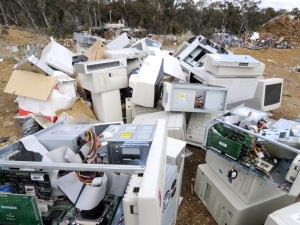Tuomas J. Lukka leads a team of researchers at Helsinki’s ZenRobotics and has developed an industrial robot with a difference. Normally, industrial robots are created for tasks such as assembling cars and so on where they perform with great excellence and accuracy in controlled settings.
However, the more dangerous and chaotic tasks have always been left to human operators such as searching for recyclable materials in piles of waste. However, Lukka and his team have designed a Recycler robot, which would hopefully take on this task of recycling. It uses metal detectors, visual sensors, tactile feedback and weight measurements with the help of a robotic arm and sorts through the probable pieces of waste and categorizes them.
 landfill area-Zen
landfill area-Zen
Trial and error has helped them to alter the learning software to identify and recognize over twelve different types of materials, which include different plastics. The robot could also remove metal, concrete and wood from a mound of debris even as they move on a conveyor belt. Edwin Olson, who is a computer scientist working at Ann Arbor’s University of Michigan revealed that he had never heard of such a task being done in such an unstructured setting.
The robot recognizes even ambiguous types of waste such as a plywood piece with nails sticking through it, via its spectrometer, based on the special patterns of light they reflect, meaning the robot could distinguish the waste based on its color and place it in an appropriate bin. The test phase has begun in the month of February and from then the robot has learned to recognize over half of the construction rubble it has been fed with. Despite this far from perfect scenario, the robot would prove to be a boon. According to the Construction Materials Recycling Association, more than 50% of the landfill material consists of construction waste in the US, and recycling even a fraction of that amount would create a huge amount of savings in landfill fees and in resources. Lukka reveals that in the future the robot could even be programmed to sort through household waste.